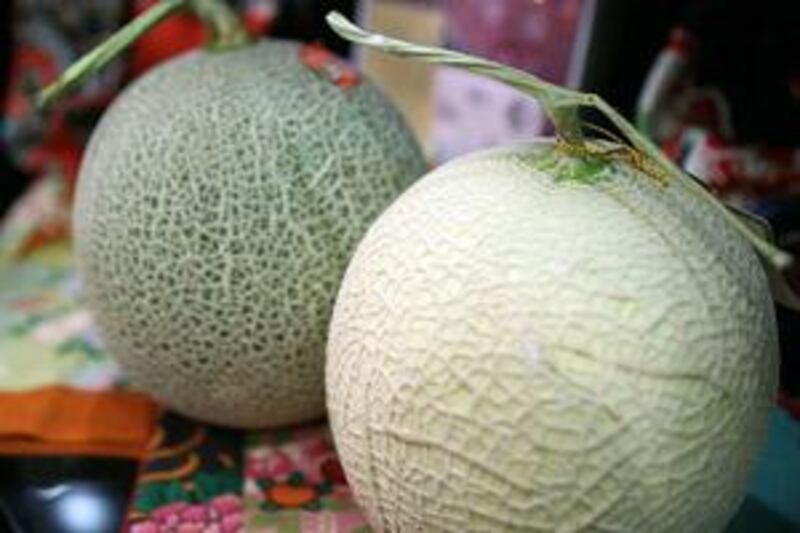If someone arrived on your doorstep for dinner and presented you with a melon rather than, say, a box of chocolates or some flowers, you might be tempted to think them rather cheap. Fruit is, after all, easy to come by. And while a slice of cantaloupe may be nice for breakfast, some find its peculiarly scented flavour not to their taste. But imagine a melon so delicate yet sweet of flavour that its arrival in the UAE called for a diplomatic ceremony; one that is individually nurtured from seed selection through growth to harvest in its native Japan; and one that few other than the royal or very rich can afford to indulge in (they sell for around Dh300 each) - then you might be a little more impressed.
Such a melon is now available in the UAE - the only country in the Middle East - where its ambassadors (regular salespeople won't do when it comes to selling elite fruit) have been marketing it as the perfect gift. "They are not for everyday use," says Miki Nakamura, a senior ambassador at Oishi Nippon, which stocks two varieties of the melon in its two outlets (in Fotouh Al Khair Mall, Abu Dhabi, and the Jumeirah Centre, Dubai). "They're too good to have just for breakfast, but are great for special occasions."
Dh195 will get you the ruby melon, which is described by Me-Ann, one of the Abu Dhabi ambassadors, as "sweet, juicy, firm and orange in the centre". While a more alarming Dh295 will snag you the coveted musk melon, or king of melons, as it is affectionately known in its homeland. This variety, which, to the untrained eye, looks not unlike its proletarian counterpart, is, according to Me-Ann, "even sweeter, softer and juicer".
Its quality, says Nakamura, boils down to its sweetness, which is intense. "The sugar content is very high," she says, "and we use a special machine that checks the sugar content of the fruit three times a day, to make sure it's in good condition." Such concentrated sugariness is achieved through a pampering regime that starts when the seed is selected. While it is growing, its exposure to sunshine is carefully monitored and smaller melons are removed from the plant to ensure that maximum nutrients are channelled into fewer fruits.
"Because there is not much land in Japan," says Nakamura, "farmers have smaller plots and can therefore really concentrate on their produce." Although it may seem an unusual gift to some, high-quality fruit has been given by Japanese nobility as a mark of respect since ancient times. As well as melons, premium varieties of pears, grapes and mandarins are also cultivated and packaged in "furoshikis" - carefully crafted gift baskets. Their concentrated levels of nutrients are said to possess healing properties. Oishi Nippon also sells three varieties of pear: the red nashi pear (Dh60 each), the green nashi pear (Dh60), and the big nashi pear (Dh80).
"The season for Japanese fruits is the summer," says Nakamura, "although now that we have started cultivating them indoors, we can sell them all year round." As well as the UAE, the Japanese government also exports them to Taiwan, Singapore, the US and Russia, where they are marketed as an unusual and healthy gift. The beauty of these fruits is that the results are achieved naturally, says Nakamura. "In some countries, they pump fruit with hormones to make them grow more. They are bigger, but they don't taste of anything. Ours are big, but they are all natural."
So what does an exceedingly well-cared-for melon taste like? Luckily, there were samples on hand for me to try. Of course, I went for the king of melons - the most expensive. Cutting it open revealed a thick syrupy glaze, which was presumably down to the sugar. It looked the same delicate green, but the texture wasn't as firm, and it melted in the mouth like a ball of soft melon ice cream. Yes, the sweetness was intense, and it lingered on the tongue longer than usual, but it was essentially the same flavour - scented with a tang that verges on fizz. That a farmer had painstakingly nurtured it for the duration of its short life wasn't necessarily evident. But it definitely had an edge over the supermarket version, as if most of the water had been sucked out, leaving behind a more intense flavour. Is it worth Dh295? Perhaps. But only if it comes with a diplomatic ceremony.
Oishi Nippon, which sells premium fresh fruits from Japan, has outlets in Fotouh Al Khair Mall, Abu Dhabi (02 635 0717), and Jumeirah Centre, Dubai (04 349 4718).










